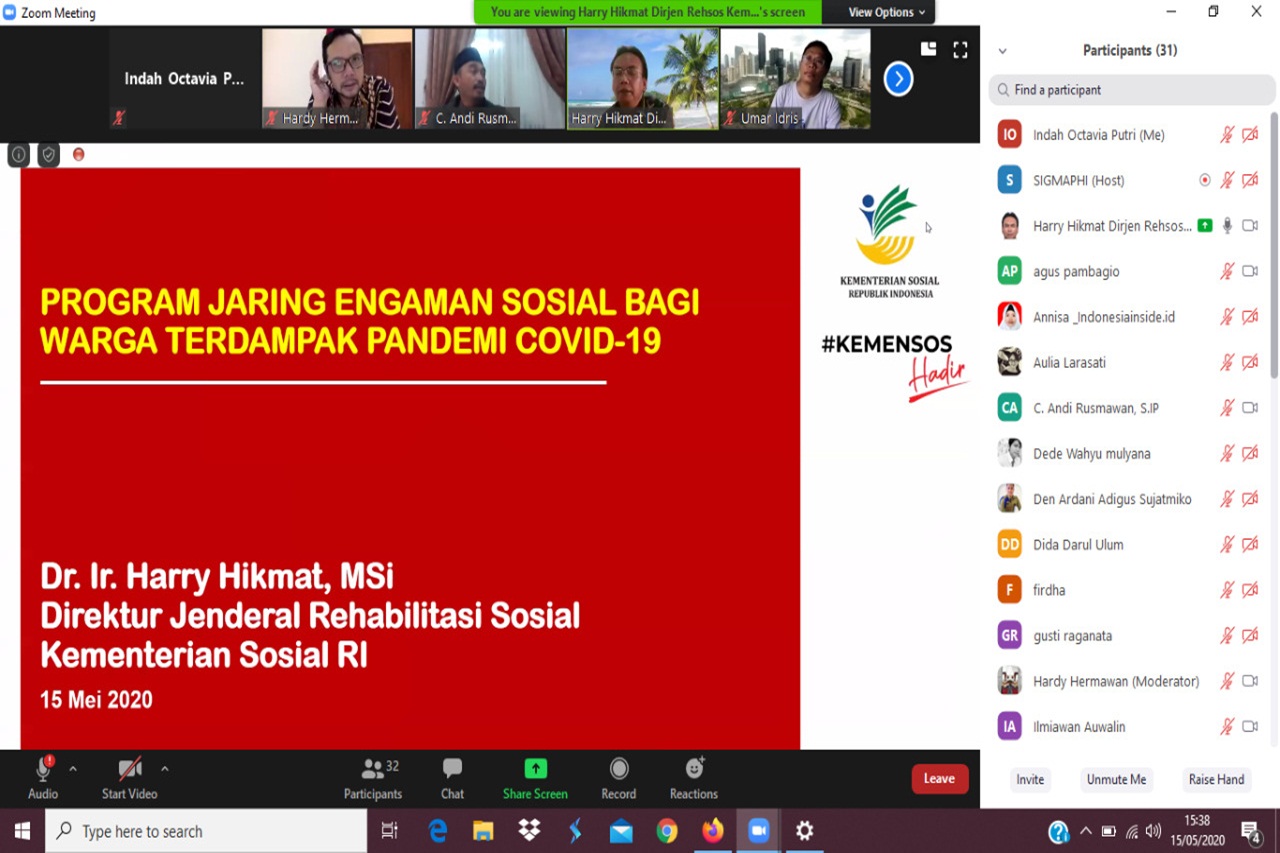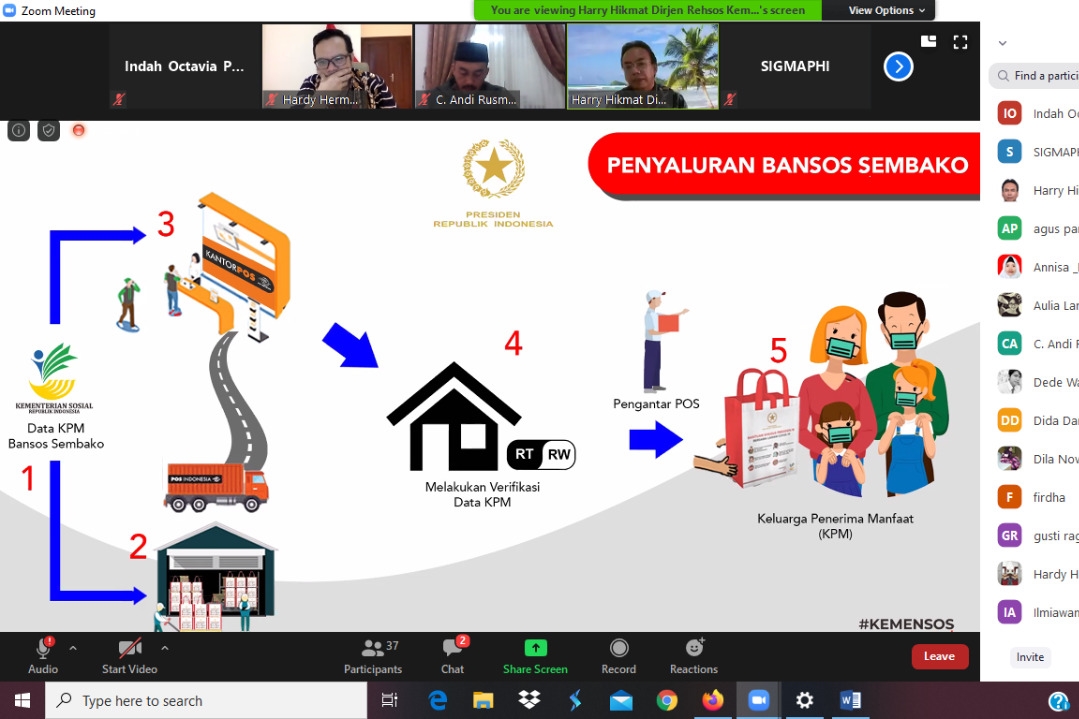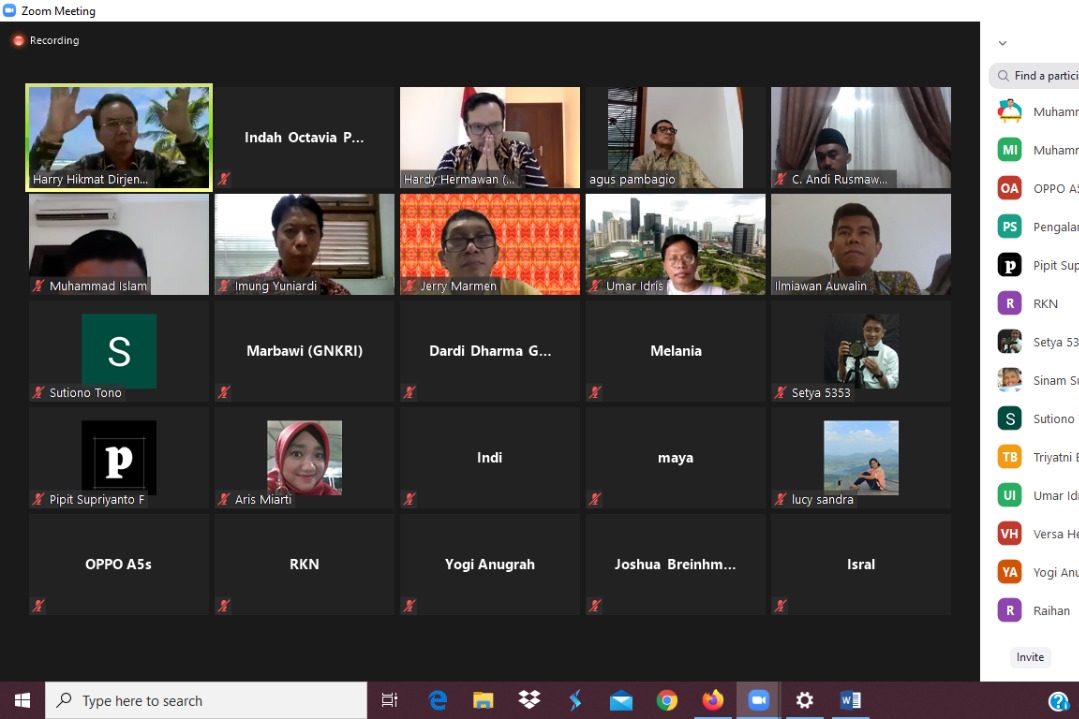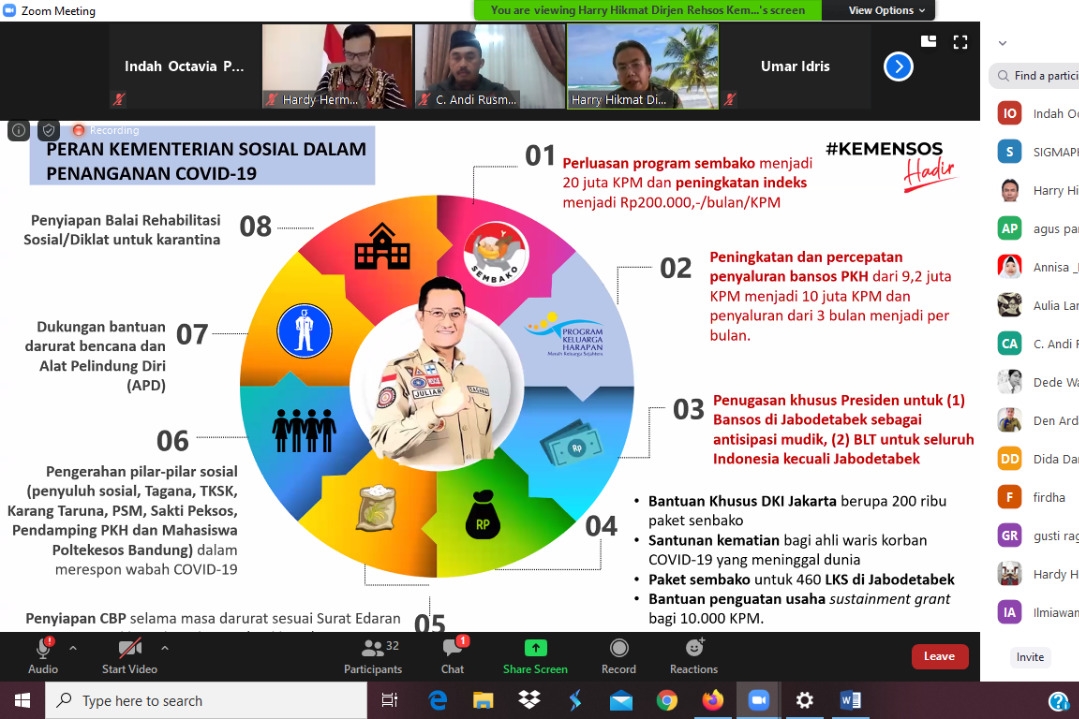JAKARTA (15 May 2020) – Director General of Social Rehabilitation of the Indonesian Ministry of Social Affairs, Harry Hikmat conveyed the Ministry of Social Affairs' Social Safety Net Program in dealing with the impact of the COVID-19 pandemic. This was conveyed in a discussion organized by SIGMAPHI, Policy, Research and Data Analysis.
Every Ministry / Institution is encouraged to create a social safety net in the conditions of the COVID-19 pandemic. This makes differences between aid programs, aid indexes, and coverage areas. It is not uncommon for the diversity of these programs to make people confused about where their social assistance will come from.
"There are people who receive assistance complaining that the president's assistance only consists of instant noodles and rice," the Director General of Social Rehabilitation illustrated. Even though it is not a program from the Ministry of Social Affairs or the President's Social Assistance. There are ministries / agencies or local governments that also have social safety net programs.
Confusion in society about the number of government programs in providing this social safety net needs to be straightened out. "The socialization of the social assistance program needs to be intensified. We have prepared it through leaflets, fillers, and various media for massive program socialization," said the Director General of Social Rehabilitation.
The Ministry of Social Affairs has made efforts to distribute special social assistance as well as regular social assistance to groups that are the focus of the Directorate General of Social Rehabilitation. These groups are persons with disabilities, neglected children, elderly people, victims of drug abuse and victims of trafficking in persons.
For example, elderly people, a group that is very vulnerable to being affected by COVID-19, need special attention. A total of 1,292,530 packages of social assistance were provided to elderly people in the form of basic necessities for the Jabodetabek area and cash social assistance for areas outside Jabodetabek. This assistance is channeled through the Center for Elderly Social Rehabilitation, Social Welfare Institutions (LKS), Association of State-Owned Banks (Himbara) and PT. POS Indonesia.
Likewise with persons with disabilities as one of the groups most affected by COVID-19. A total of 297,239 aid packages were distributed in the form of basic necessities for the Jabodetabek area and cash social assistance for areas outside Jabodetabek. This social assistance has been distributed since April 2020 and is still running until now.
Then, the Ministry of Social Affairs, through the Directorate General of Social Rehabilitation, also seeks to handle neglected residents affected by COVID-19. In collaboration with the DKI Jakarta Social Service, the Ministry of Social Affairs provides Temporary Shelters (TPS) for street children, homeless people, and beggars. scavengers and other Beneficiaries (PM) affected by COVID-19 in the form of a Sports Arena (GOR).
"As of today (15/5), a total of 1,442 PM have been handled in GORs in 5 points in DKI Jakarta," said the Director General of Social Rehabilitation. From these 1,442 PMs, 989 PM have been sent home to their families, 194 PM were referred to the orphanage / hall / fasker, 82 PM left the place without any information and 177 still live in the GOR.
The Ministry of Social Affairs also provides a TPS in the form of a Social Rehabilitation Center for further handling of referrals from GOR. Currently, a total of 161 PM have received service at the hall. Of the total, 72 PM have been returned to their family, 6 PM were referred to the nursing home / health facility, 12 PM left without any information and 71 PM are still living in the hall.
The Directorate General of Social Rehabilitation has also designed a TPS system in the community in collaboration with LKS. This system was built to restrain marginalized communities from engaging in public activities during the Large-Scale Social Restrictions (PSBB) period.
"I had time to comb various communities such as the scavenger community, the community under the toll road, the fishing community in Muara Angke and Kaliadem as well as providing them with basic food assistance," said the Director General of Social Rehabilitation.
The Ministry of Social Affairs wants to ensure that social assistance is right on target. The fact is that many of these marginalized groups have not been touched by social assistance. They are truly needy citizens but they are not recorded. "So we pick up the ball. Give direct social assistance. That is a picture of the Ministry of Social's efforts to deal with the impact of COVID-19," said the Director General of Social Rehabilitation.
The Ministry of Social Affairs has made efforts to ensure the accuracy of beneficiary data. starting from intensively conducting virtual coordination meetings with regional heads such as Governors, Regents, Mayors, all Heads of Social Services, but only about 70% were proactive in updating data.
In addition, the Ministry of Social Affairs also creates a social assistance complaint service, optimizes the roles of the Integrated Service and Referral System (SLRT), Social Welfare Center (Puskesos) and social welfare pillars for socialization of social assistance programs to assistance in social assistance distribution.
Then, the Ministry of Social Affairs has a Next Generation Social Welfare Information System (SIKS-NG) with the Integrated Social Welfare Data format (DTKS) which can be accessed at the Social Service. So, Social Services Agency can make changes and replacement of beneficiaries according to conditions in the field.
Public Policy Observer, Agus Pembagio, responded to various facts in the field that integrator data is needed to fix the current chaos in data collection.
Lecturer at the Faculty of Business Economics, Airlangga University, Ilmiawan Auwalin revealed that the role of the Province is also important to be activated in the context of updating data. In addition, there is also a need for political willness in improving data.
At the last minute of the meeting, the Director General for Social Rehabilitation revealed that there is a need for joint data improvement. The decentralization system must be the main driver. SIKS-NG will continue to be developed. "All parties must be involved, starting from RT, RW, Village / Sub-district, District, to Regency holding responsibility in terms of data verification and validation," he concluded.
This discussion lasted for about 2 hours and was attended by various elements, ranging from government, civil society, academics to researchers.
 Bahasa
Bahasa
 English
English





